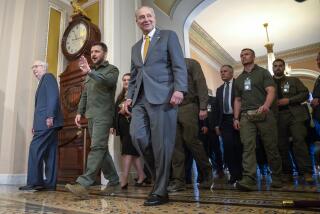U.S. Senators Advise Patience, Say Time Is on U.S., Allies’ Side : Strategy: Iraqi leader is playing a losing hand in Kuwait, the foreign relations chairman asserts.
- Share via
MANAMA, Bahrain — A high-level mission of U.S. senators Sunday called for patience in a military showdown to force Iraqi troops out of Kuwait, insisting that time is on the side of the American-dominated multinational forces.
On the second leg of a Middle East tour, the 14-man Senate delegation led by Foreign Relations Committee Chairman Claiborne Pell (D-R.I.) told reporters that Iraqi President Saddam Hussein is playing a losing hand in his determination to hold onto the neighboring sheikdom his troops invaded a month ago.
Washington and its allied Western, Arab and Asian forces should tighten the squeeze on Iraq with the U.N.-mandated blockade in the weeks ahead. “We should not be setting any deadlines because they would weaken us,” Pell said at a press conference aboard the U.S. command ship Blue Ridge in port at Manama.
Sen. Jesse Helms, the ranking Republican on the committee, said: “We have to have patience for the embargo to work.” The North Carolina senator said Hussein had made a critical mistake in taking hostage thousands of Western civilians as human shields against possible attack.
“Saddam has made a mistake,” Helms argued. “He has misjudged the civility of most of the world. He’s bound to lose.”
The Senate group made its first stop Saturday in Saudi Arabia, where the lawmakers visited American troops in the field. “We were up with a Marine brigade, the outfit from Twentynine Palms,” said California Democrat Alan Cranston. “They’re doing fine. It’s very hot, but they’re OK.”
Sunday the panel was briefed on the naval situation in the Persian Gulf aboard the Blue Ridge, the recently arrived flagship of Vice Adm. Henry H. Mauz, commander of the American naval effort in Middle East waters.
“We’re prepared for a long-term commitment out here,” said Ohio Democrat John Glenn. “Stability in the gulf represents vital American interests.”
Despite their emphasis on long-term military and political strategy, the senators delivered a harsh message on Hussein’s tactic of detaining foreign civilians and sending them to military and industrial sites considered vulnerable to attack.
Said Sen. John Heinz (R-Pa.): “The U.S. position is clear. The United States and the Arab countries have the same position. . . . If the hostages face any harm, Saddam will be guilty of a war crime.”
Saturday night, the Senate delegation joined a group of touring congressmen for dinner with top Bahraini officials. On Sunday, they agreed that timing is a key factor in the Kuwait crisis, which has thrust this critical oil-producing region into a tense standoff.
The rapid American-led buildup in defense of the Saudi Arabia and its oil fields, the largest in the world, has forestalled any immediate Iraqi attempt to push farther than Kuwait. But the majority of Arab states, backed by the U.N. Security Council resolutions and an armada of international military power, insist that Iraq withdraw its troops from Kuwait, which Baghdad last week declared was now a province of Iraq.
The Saudi Arabian defense minister, Prince Sultan ibn Abdulaziz, said Saturday that Saudi-based U.S. troops could not operate from Saudi soil to attack Iraq, drive its soldiers out of Kuwait or stage operations to rescue Americans held hostage. The line, consistent with Washington’s, held that foreign deployments in Saudi Arabia are for defensive purposes only.
But here in Bahrain, which like other gulf sheikdoms has become emboldened by the buildup of Western forces, officials say there must be a limit to Iraqi transgressions, according to the senatorial mission.
“Yes,” said Sen. Christopher J. Dodd (D-Conn.), “they have a sense of timing. It’s in their minds.” He would not say whether a deadline for Iraqi withdrawal was discussed.
More to Read
Get the L.A. Times Politics newsletter
Deeply reported insights into legislation, politics and policy from Sacramento, Washington and beyond. In your inbox twice per week.
You may occasionally receive promotional content from the Los Angeles Times.










